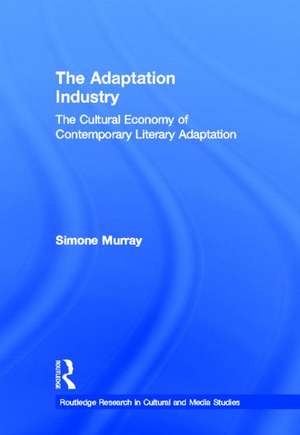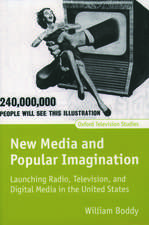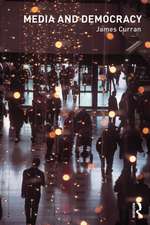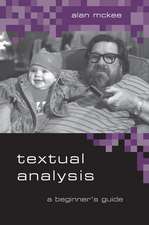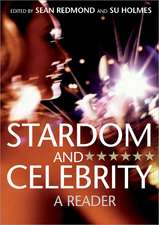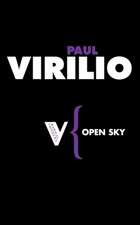The Adaptation Industry: The Cultural Economy of Contemporary Literary Adaptation: Routledge Research in Cultural and Media Studies
Autor Simone Murrayen Limba Engleză Hardback – 5 aug 2011
| Toate formatele și edițiile | Preț | Express |
|---|---|---|
| Paperback (1) | 438.86 lei 6-8 săpt. | |
| Taylor & Francis – 8 iul 2013 | 438.86 lei 6-8 săpt. | |
| Hardback (1) | 1057.43 lei 6-8 săpt. | |
| Taylor & Francis – 5 aug 2011 | 1057.43 lei 6-8 săpt. |
Din seria Routledge Research in Cultural and Media Studies
- 18%
 Preț: 701.95 lei
Preț: 701.95 lei -
 Preț: 310.85 lei
Preț: 310.85 lei -
 Preț: 311.61 lei
Preț: 311.61 lei -
 Preț: 309.50 lei
Preț: 309.50 lei - 9%
 Preț: 1005.55 lei
Preț: 1005.55 lei -
 Preț: 364.71 lei
Preț: 364.71 lei -
 Preț: 301.59 lei
Preț: 301.59 lei -
 Preț: 310.99 lei
Preț: 310.99 lei -
 Preț: 272.01 lei
Preț: 272.01 lei -
 Preț: 318.07 lei
Preț: 318.07 lei - 9%
 Preț: 934.96 lei
Preț: 934.96 lei -
 Preț: 389.88 lei
Preț: 389.88 lei -
 Preț: 325.59 lei
Preț: 325.59 lei -
 Preț: 362.42 lei
Preț: 362.42 lei -
 Preț: 309.27 lei
Preț: 309.27 lei - 8%
 Preț: 382.97 lei
Preț: 382.97 lei -
 Preț: 356.64 lei
Preț: 356.64 lei -
 Preț: 309.99 lei
Preț: 309.99 lei -
 Preț: 327.02 lei
Preț: 327.02 lei -
 Preț: 309.31 lei
Preț: 309.31 lei -
 Preț: 420.36 lei
Preț: 420.36 lei -
 Preț: 485.07 lei
Preț: 485.07 lei - 18%
 Preț: 1231.89 lei
Preț: 1231.89 lei -
 Preț: 418.56 lei
Preț: 418.56 lei - 18%
 Preț: 1116.38 lei
Preț: 1116.38 lei - 18%
 Preț: 1061.22 lei
Preț: 1061.22 lei - 18%
 Preț: 1222.85 lei
Preț: 1222.85 lei - 18%
 Preț: 1055.51 lei
Preț: 1055.51 lei - 18%
 Preț: 1061.57 lei
Preț: 1061.57 lei -
 Preț: 441.96 lei
Preț: 441.96 lei - 18%
 Preț: 1051.72 lei
Preț: 1051.72 lei - 18%
 Preț: 1056.14 lei
Preț: 1056.14 lei - 18%
 Preț: 1054.97 lei
Preț: 1054.97 lei - 18%
 Preț: 1107.94 lei
Preț: 1107.94 lei - 18%
 Preț: 1056.63 lei
Preț: 1056.63 lei - 18%
 Preț: 1066.79 lei
Preț: 1066.79 lei - 18%
 Preț: 1117.77 lei
Preț: 1117.77 lei - 18%
 Preț: 1281.24 lei
Preț: 1281.24 lei - 18%
 Preț: 1005.01 lei
Preț: 1005.01 lei - 18%
 Preț: 737.98 lei
Preț: 737.98 lei - 18%
 Preț: 1056.95 lei
Preț: 1056.95 lei
Preț: 1057.43 lei
Preț vechi: 1289.56 lei
-18% Nou
Puncte Express: 1586
Preț estimativ în valută:
202.36€ • 219.74$ • 169.99£
202.36€ • 219.74$ • 169.99£
Carte tipărită la comandă
Livrare economică 22 aprilie-06 mai
Preluare comenzi: 021 569.72.76
Specificații
ISBN-13: 9780415999038
ISBN-10: 0415999030
Pagini: 288
Ilustrații: 20 Halftones, black and white; 3 Tables, black and white
Dimensiuni: 152 x 229 x 16 mm
Greutate: 0.53 kg
Ediția:1
Editura: Taylor & Francis
Colecția Routledge
Seria Routledge Research in Cultural and Media Studies
Locul publicării:Oxford, United Kingdom
ISBN-10: 0415999030
Pagini: 288
Ilustrații: 20 Halftones, black and white; 3 Tables, black and white
Dimensiuni: 152 x 229 x 16 mm
Greutate: 0.53 kg
Ediția:1
Editura: Taylor & Francis
Colecția Routledge
Seria Routledge Research in Cultural and Media Studies
Locul publicării:Oxford, United Kingdom
Public țintă
Postgraduate and UndergraduateCuprins
Contents Acknowledgements List of Figures Introduction 1: What Are You Working On?: The Expanding Role of the Author in an Era of Cross-media Adaptation 2: World Rights: Literary Agents as Brokers in the Contemporary Mediasphere 3: Making Words Go Further: Book Fairs, Screen Festivals and Writers’ Weeks as Engine-rooms of Adaptation 4: The Novel Beyond the Book: Literary Prize-winners on Screen 5: Best Adapted Screenwriter?: The Intermedial Figure of the Screenwriter in the Contemporary Adaptation Industry 6: Cultivating the Reader: Producer and Distributor Strategies for Converting Readers into Audiences Afterword: Restive Audiences and Adaptation Futures Notes Bibliography Index
Recenzii
"Simone Murray’s book makes good on its promise to materialize adaptation studies. Murray frees the study of adaptation from its most persistent and constraining orthodoxies: the reliance on text-based analysis, the preoccupation with issues of fidelity, the privileging of individual over institutional agency. The Adaptation Industry gives us the first systematic examination of the way adaptations are produced: not as versions or translations of an original, nor as mere mediations between properly artistic fields of practice, but as a cultural form in their own right – and one whose ascendency in our time has not, until now, been at all adequately appreciated. This is a game-changing book which no one interested in cultural theory or the contemporary narrative arts can afford to ignore."
-- James F. English, University of Pennsylvania
"Simone Murray’s book makes good on its promise to materialize adaptation studies. Murray frees the study of adaptation from its most persistent and constraining orthodoxies: the reliance on text-based analysis, the preoccupation with issues of fidelity, the privileging of individual over institutional agency. The Adaptation Industry gives us the first systematic examination of the way adaptations are produced: not as versions or translations of an original, nor as mere mediations between properly artistic fields of practice, but as a cultural form in their own right – and one whose ascendency in our time has not, until now, been at all adequately appreciated. This is a game-changing book which no one interested in cultural theory or the contemporary narrative arts can afford to ignore." - James F. English, University of Pennsylvania, USA
'This book is the culmination of Murray's investigations and a powerful argument for reconfiguration of scholarly practice in studying the convergent media industry within which adaptation is practiced. It is informed by her close industrial observation and traces the roles of the six stakeholder groups she identifies: authors, agents, publishers, festival directors, literary prize-giving committees and film producers and distributors.' - Frances Bonner, Script and Print
"Murray’s industrial approach of literature definitely opens up new avenues for literary studies." - Patrick Cattrysse, Translation (a transdisciplinary journal)
"Murray's book offers a timely sociology and a political economy of the industry-topics that have been touched upon by scholars, yet, never so thoroughly or in such satisfying detail. As such, it provides an excellent and very useful synopsis of how we got here, as well as a platform for moving forward to a study of the industry that gives us the adaptations that are raison d'etre for what we do."- Joyce Goggin, Adaptation (international journal)
"Murray has provided a compelling conceptual framework and richly-described account of the contemporary cultural economy. In particular, she dispenses with the notion that the prestige of the original work of fiction and the commercial success of its screen adaptation are somehow separate or at odds. Anyone with any lingering misconceptions about the often symbiotic relationship between economic and symbolic capital in the cultural field needs to read The Adaptation Industry-now." -Casey Brienza, London School of Economics Review of Books
"Murray’s key point is thought-provoking. With literary material now being produced in multifaceted ways, authorial reputation can draw audiences across media platforms in ways that are increasingly important for cultural success.[…] Books are part of a larger media economy, and The Adaptation Industry offers astute insights into how that economy works." -David Finkelstein, Times Literary Supplement
"Simone Murray makes a major contribution to adaptation studies scholarship by developing a methodology focused on production-centered questions of how adaptations get made, rather than the field’s more traditional interest in semiotic questions of how adaptations make meaning. Her method combines facets of book history, political economy, and cultural theory to arrive at a nuanced circuit model in the vein of Robert Darnton’s famous approach to the book trade. Murray’s circuit, however, focuses on the increasing convergence of media industries in the last thirty years, chiefly with respect to book and film productions, but also with the occasional nod towards comics and video games.[…] Thanks to her hybrid method, The Adaptation Industry will prove valuable to literary and film scholars as well as cultural and book historians." – Nico Dicecco, Simon Fraser University
"Murray's work is designed to open the eyes of academics who have been trained in the worship of the book as autonomous, aesthetic reality and who still content themselves with comparing the texts with their cinematic counterparts in a sterile face-off. The adaptation industry is indeed a reality, and a flourishing one at that...Let's not mince words: The Adaptation Industry is likely to entirely restructure this field of research and thus redeem the status of adaptation studies as the poor cousin to literary and film studies. Several important works in the field have come out of the UK and US in recent years;...We can, however, consider Murray's The Adaptation Industry to be a pioneering work." – Jean-Louis Jeannelle, Critique
"Simone Murray’s ground-breaking 2012 monograph The Adaptation Industry offers new perspectives on how to broaden and deepen the reach of adaptation studies. [...] Murray’s study contributes significantly to showcasing the interdisciplinary potential of adaptation studies as well as its aptness for studying the arts from a sociological perspective that puts aesthetics and other traditional concerns of humanities scholarship into a larger frame. Ideally, then, this frame allows for more multidimensional analyses of culture, cultural artefacts, and cultural values." --Nassim WinnieBalestrini, Kritikon Litterarum
"[T]he most fascinating book on the subject is now indisputably The Adaptation Industry Simone Murray (Routledge, 2011). I should add here (and far from being the only observation of the sort): 'Not yet
translated in France, alas'." --Jan Baetens, University of Leuven
"Simone Murray’s The Adaptation Industry contributes new insights and perspectives on a number of important issues about how adaptations work in the twenty-first-century book market. She shows how the book and film industries increasingly interact with each other and how the road from novel to film is characterized by systematics and consciously designed structures rather than a random course of events. The survey highlight is the chapter on book fairs and film festivals, as well as the line of argument about the increasing importance of intellectual property rights for the book market... The study is recommended reading for all those interested in the book world of today." --Karl Berglund, Uppsala University for Samlaren, 2014
-- James F. English, University of Pennsylvania
"Simone Murray’s book makes good on its promise to materialize adaptation studies. Murray frees the study of adaptation from its most persistent and constraining orthodoxies: the reliance on text-based analysis, the preoccupation with issues of fidelity, the privileging of individual over institutional agency. The Adaptation Industry gives us the first systematic examination of the way adaptations are produced: not as versions or translations of an original, nor as mere mediations between properly artistic fields of practice, but as a cultural form in their own right – and one whose ascendency in our time has not, until now, been at all adequately appreciated. This is a game-changing book which no one interested in cultural theory or the contemporary narrative arts can afford to ignore." - James F. English, University of Pennsylvania, USA
'This book is the culmination of Murray's investigations and a powerful argument for reconfiguration of scholarly practice in studying the convergent media industry within which adaptation is practiced. It is informed by her close industrial observation and traces the roles of the six stakeholder groups she identifies: authors, agents, publishers, festival directors, literary prize-giving committees and film producers and distributors.' - Frances Bonner, Script and Print
"Murray’s industrial approach of literature definitely opens up new avenues for literary studies." - Patrick Cattrysse, Translation (a transdisciplinary journal)
"Murray's book offers a timely sociology and a political economy of the industry-topics that have been touched upon by scholars, yet, never so thoroughly or in such satisfying detail. As such, it provides an excellent and very useful synopsis of how we got here, as well as a platform for moving forward to a study of the industry that gives us the adaptations that are raison d'etre for what we do."- Joyce Goggin, Adaptation (international journal)
"Murray has provided a compelling conceptual framework and richly-described account of the contemporary cultural economy. In particular, she dispenses with the notion that the prestige of the original work of fiction and the commercial success of its screen adaptation are somehow separate or at odds. Anyone with any lingering misconceptions about the often symbiotic relationship between economic and symbolic capital in the cultural field needs to read The Adaptation Industry-now." -Casey Brienza, London School of Economics Review of Books
"Murray’s key point is thought-provoking. With literary material now being produced in multifaceted ways, authorial reputation can draw audiences across media platforms in ways that are increasingly important for cultural success.[…] Books are part of a larger media economy, and The Adaptation Industry offers astute insights into how that economy works." -David Finkelstein, Times Literary Supplement
"Simone Murray makes a major contribution to adaptation studies scholarship by developing a methodology focused on production-centered questions of how adaptations get made, rather than the field’s more traditional interest in semiotic questions of how adaptations make meaning. Her method combines facets of book history, political economy, and cultural theory to arrive at a nuanced circuit model in the vein of Robert Darnton’s famous approach to the book trade. Murray’s circuit, however, focuses on the increasing convergence of media industries in the last thirty years, chiefly with respect to book and film productions, but also with the occasional nod towards comics and video games.[…] Thanks to her hybrid method, The Adaptation Industry will prove valuable to literary and film scholars as well as cultural and book historians." – Nico Dicecco, Simon Fraser University
"Murray's work is designed to open the eyes of academics who have been trained in the worship of the book as autonomous, aesthetic reality and who still content themselves with comparing the texts with their cinematic counterparts in a sterile face-off. The adaptation industry is indeed a reality, and a flourishing one at that...Let's not mince words: The Adaptation Industry is likely to entirely restructure this field of research and thus redeem the status of adaptation studies as the poor cousin to literary and film studies. Several important works in the field have come out of the UK and US in recent years;...We can, however, consider Murray's The Adaptation Industry to be a pioneering work." – Jean-Louis Jeannelle, Critique
"Simone Murray’s ground-breaking 2012 monograph The Adaptation Industry offers new perspectives on how to broaden and deepen the reach of adaptation studies. [...] Murray’s study contributes significantly to showcasing the interdisciplinary potential of adaptation studies as well as its aptness for studying the arts from a sociological perspective that puts aesthetics and other traditional concerns of humanities scholarship into a larger frame. Ideally, then, this frame allows for more multidimensional analyses of culture, cultural artefacts, and cultural values." --Nassim WinnieBalestrini, Kritikon Litterarum
"[T]he most fascinating book on the subject is now indisputably The Adaptation Industry Simone Murray (Routledge, 2011). I should add here (and far from being the only observation of the sort): 'Not yet
translated in France, alas'." --Jan Baetens, University of Leuven
"Simone Murray’s The Adaptation Industry contributes new insights and perspectives on a number of important issues about how adaptations work in the twenty-first-century book market. She shows how the book and film industries increasingly interact with each other and how the road from novel to film is characterized by systematics and consciously designed structures rather than a random course of events. The survey highlight is the chapter on book fairs and film festivals, as well as the line of argument about the increasing importance of intellectual property rights for the book market... The study is recommended reading for all those interested in the book world of today." --Karl Berglund, Uppsala University for Samlaren, 2014
Descriere
Adaptation constitutes the driving force of contemporary culture, with stories adapted across an array of media formats. However, adaptation studies has been concerned almost exclusively with textual analysis, in particular with compare-and-contrast studies of individual novel and film pairings. This has left almost completely unexamined crucial questions of how adaptations come to be made, what are the industries with the greatest stake in making them, and who the decision-makers are in the adaptation process. This book constructs an overdue sociology of contemporary literary adaptation, never losing sight of the material and institutional dimensions of this powerful process.
